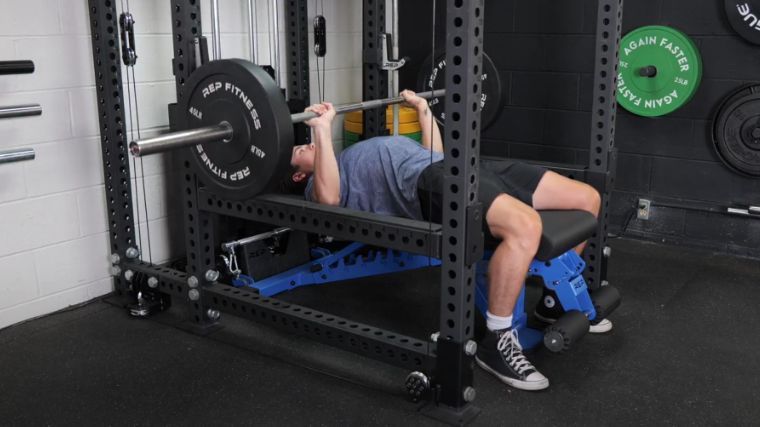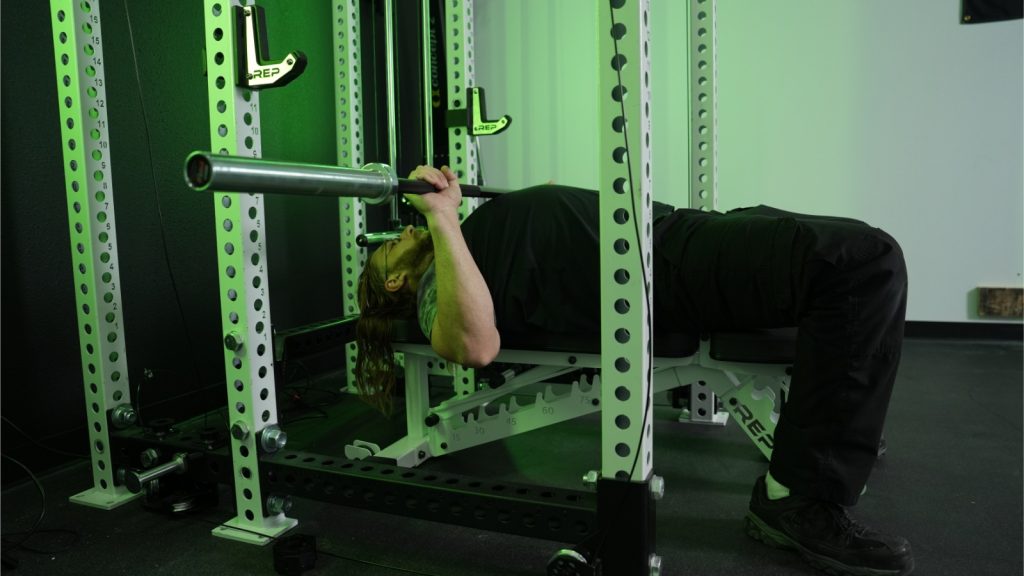How long should you rest when you’re on the bench? A new study sheds some light.
Every Monday and in gyms around the world, tribes of teenagers gather at one of the local gym’s bench press stations. They take turns performing sets until, basically, failure. Sometimes there are four or five people teaming up with the same bar. If you’re at the end of the line, you’re probably waiting at least a few minutes for your turn.
Most people feel that training this way is suboptimal for breast hypertrophy. A new study from the Journal of Sports Sciences do not agree: Longer (longer) rest periods seem to correlate with better bench press performance, be it strength training or hypertrophy. (1)

[Related: We Tested and Ranked 12 of The Best Barbells]
What the study says
The paper published in December 2023 was written by Janiijevi and colleagues and is titled: “Optimizing Mechanical Performance in the Bench Press: The Combined Influence of Interset Rest Periods and Proximity to Failure.”
In short, the researchers’ data proved it rest periods of up to five minutes between sets of bench press exercises promoted better performance than rest for one or three minutes.
[Related: The Best Pre-Workout Supplements for Chest Workouts]
what they did
Janiijevi et al. took a small group of “physically active individuals” and assigned them various bench press protocols. Here’s a breakdown:
- 23 participants (15 men and 8 women) were divided into one of the three groups.
- All three groups rested for either one, three, or five minutes between sets of the Smith machine bench press.
- Subjects completed six separate workouts from four sets at about 75% of your 1-rep max.
- For first three workouts, participants were asked to stop benching at approx six repetitions in reserve (LAUGHS). During the last three training sessions, the participants stopped at four RIR.
- The researchers used the participants bar speed as an indicator of proximity to failure.
[Related: The Best Bench Press Programs for All Levels]
What they found
Overall, the results of this study paint a pretty intuitive picture. Longer relative rest periods support better strength training performance than short rest, a prescription made by other similar studies in the past. (2)(3) But that’s not all:
This can be attributed to the different energy resources your body relies on for activity sessions of different durations. Your muscles and central nervous system need more time to recover from heavier lifting than with lighter, endurance-focused sets.
[Related: The Best Wrist Wraps for Bench Pressing]
This finding aligns with the perspectives of more contemporary sports science. The more explosive you try to lift, the more time you need to rest. An essential caveat of this study is that the authors focused on how rest periods influence sets not brought to absolute failure.
These findings may not apply if you bench press for as many reps as possible during your chest workouts. That said, training to absolute failure is not strictly necessary to build muscle or increase strength. (4)
limitations
No study is without its limitations, and this paper, while valuable, should not necessarily close the book on rest periods during strength training or powerlifting training sessions.
- Group of participants: With only 23 total participants, the sample size was quite small.
- Gender disparity: The authors recruited nearly twice as many men as women, which may have colored their data somewhat.
- Selection of exercises: This study was conducted on the Smith machine bench press instead of the free weight barbell bench.
what should you do
As the authors of the paper’s abstract note, “to maintain the mechanical performance of the bench press, Rest periods between sets of five minutes are necessary when sets are completed near failure.”
They indicate that if you prefer to train a little further from failure as in, lift lighter weights shorter rest periods of around three minutes will not decrease performance much.

Taking five minutes to rest between sets doesn’t seem to hurt strength or muscle-building efforts. That crowd of high schoolers you see “4 on 1” on the bench press on Monday nights might have been on to something after all.
More research content
References
- Janiijevi, D., Miras-Moreno, S., Morenas-Aguilar, MD, Moraga-Maureira, E., Weakley, J., & Garca-Ramos, A. (2023). Optimizing mechanical performance in the bench press: the combined influence of interset rest periods and proximity to failure. Journal of sports sciences, 41(24), 21932200.
- de Salles, BF, Simo, R., Miranda, F., Novaes, J.daS., Lemos, A., & Willardson, JM (2009). Rest interval between sets in strength training. Sports Medicine (Auckland, NZ), 39(9), 765777.
- Senna, Gilmar W.; Willardson, Jeffrey M.; Scudese, Estevo; Simo, Roberto; Queiroz, Cristiano; Avelar, Raoni; Martin Dantas, Estlio H.. Effect of different interset rest intervals on the performance of simple and multi-joint exercises with near-maximal loads. Journal of Strength and Conditioning Research 30(3):p 710-716, March 2016.
- Grgic J, Schoenfeld BJ, Orazem J, Sabol F. Effects of resistance training performed to repetition failure or non-failure on muscle strength and hypertrophy: a systematic review and meta-analysis. J Sport Health Science. 2022 Mar;11(2):202-211. doi: 10.1016/j.jshs.2021.01.007. Epub 2021 Jan 23. PMID: 33497853; PMCID: PMC9068575.
#study #tells #rest #bench #press #build #muscle #strength #BarBend
Image Source : barbend.com
